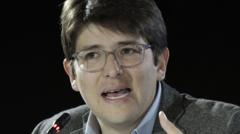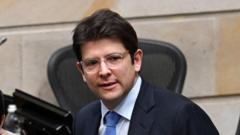The impending South Korean election is framed by the fallout from a failed martial law attempt, polarizing politics, and the controversial figures running. As voters seek stability, opposition candidate Lee Jae-myung emerges as a symbol of hope for reform, while rival Kim Moon-soo struggles with his party's tarnished image. The outcome may determine the future trajectory of the nation and its governance.
South Korea's Pivotal Election: Moving Beyond Martial Law

South Korea's Pivotal Election: Moving Beyond Martial Law
In a nation grappling with political turmoil and the shadows of a recent martial law crisis, voters face a crucial decision in the upcoming election that could redefine their democracy.
The South Korean landscape is under intense scrutiny as it prepares for a critical election amidst the aftermath of a failed attempt at martial law last December. The leading opposition candidate, Lee Jae-myung, has gained attention not only for his political stance but also for his unconventional campaigning style—now donning a bullet-proof vest and speaking from behind fortified glass at his rallies, a stark reminder of the political violence enveloping the country.
The crisis began with President Yoon Suk Yeol's notorious attempt to seize control through military means, which was met with widespread resistance leading to his impeachment. This has left the nation without a president, intensifying divisions and escalating political violence, as evidenced by the rise of chants at protests where leaders are openly threatened with execution. Lee's campaign has been marked by serious security concerns, including credible assassination plots aimed at him.
This election may serve as a referendum on the formerly ruling party and its controversial tactics. The People Power Party (PPP), still aligned with Yoon despite the backlash, has chosen Kim Moon-soo—a candidate criticized for his reluctant apology regarding martial law. This choice has alienated many voters, especially as they seek accountability and healing from the chaos of the past.
Polling suggests that Lee is currently leading, presenting himself as the candidate who can assure voters that such authoritarian measures are a thing of the past. Promising constitutional changes to prevent martial law declarations, Lee's rhetoric resonates across the political spectrum, with former opponents now viewing him as a necessary leader to restore democracy.
Conversely, Kim has been positioning himself as the "fair and just candidate," aiming to court those who feel they must vote for him simply as an alternative to Lee. However, his past as a human rights activist contrasts sharply with the more conservative platform he has adopted, leaving many unsure of his true intentions.
While many voters feel compelled to choose based on opposition to each candidate rather than genuine support, the outcome of this election may swing the nation towards stability or deeper polarization. Analysts stress that each path carries significant implications for governance in South Korea.
As votes are cast, the nation is painfully aware of the gravity of the impending choice they face. With pressing issues awaiting resolution—like upcoming trade negotiations with the U.S.—the hope is that this election not only stabilizes the political landscape but also restores faith in democratic principles that have been shaken by crisis. The role of the next president will be pivotal in either reinforcing or reimagining the trajectory of South Korea's governance.






















